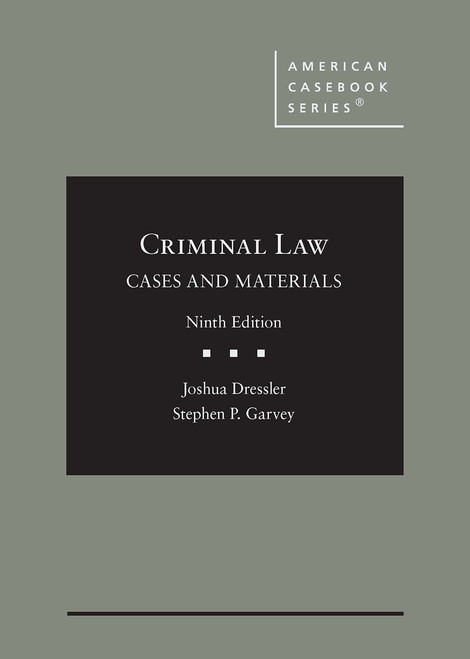Highly respected authorship defines Criminal Law and Its Processes: Cases and Materials. Sanford H. Kadish, Stephen J. Schulhofer, Carol S. Steiker, and new co-author Rachel E. Barkow are nationally recognized scholars. Their cohesive intellectual framework views the law as an instrument of social control, providing an analytical tool with which students can interpret and understand doctrine. Criminal Law and Its Processes: Cases and Materials focuses on developing an understanding of principles and rules applicable to all crimes, rather than the detailed and disjointed elements of any particular crime. Cases-and-notes pedagogy, with excerpted materials, questions, and problems, illuminate the material. Problems enhance students' understanding of the basic principles by testing their applications and interactions in the context of particular offenses.
The Ninth Edition preserves the continuity with its predecessors and makes little fundamental change in organization or coverage, retaining nearly all the principal teaching cases, with recent cases and illustrations added. The text has been carefully edited throughout to enhance the transparency of the organization and accessibility of the notes and questions. Text has been added that guides students--before and after main cases--to understand what those cases are designed to illustrate. Overall, the book features increased clarity and ease of teaching while preserving the book's challenging and sophisticated content. A completely reorganized and revised chapter on group crime includes more student-friendly treatment of accomplice liability and conspiracy that will facilitate the mastery of basic doctrine while emphasizing important policy questions. A new section on punishing corporations for criminal conduct includes an analysis of deferred prosecution and non-prosecution agreements. The updated theft chapter explores the important modern crimes of honest services fraud and identity theft. New problems also test students' understanding of traditional theft offenses as applied to modern technology and intellectual property. The chapter on rape has been dramatically revised with current examples of debates over force and consent as well as new notes on male rape victims and human trafficking. Revised coverage of the death penalty provides a balanced treatment of the issue, incorporates the latest empirical research, and offers new notes on the potential causes of racial discrimination. An updated chapter on homicide includes a completely new section on felony murder. Also revised is the treatment of proportionality; it includes recent Supreme Court case law under the Eighth Amendment and challenges to life without the possibility of parole sentences. The question of what to punish is now explored through the lens of teenage bullying. Finally, new sentencing materials have been introduced, including a case study of Bernie Madoff's sentencing.
Features
- Highly respected authorship
- Kadish, Schulhofer, Steiker, and new co-author Barkow are nationally recognized scholars
- Cohesive intellectual framework
- views the law as an instrument of social control
- provides an analytical tool with which students can interpret and understand doctrine
- Cases-and-notes pedagogy
- includes excerpted materials, questions, and problems
- Develops an understanding of principles and rules applicable to all crimes
- sees beyond the detailed, disjointed elements particular crimes
- Helpful problems
- enhance students understanding of basic principles
- test their applications and interaction in the context of particular offenses



![Criminal Law and Its Processes: Cases and Materials [Connected Casebook] (Aspen Casebook) (Aspen Casebooks) Criminal Law and Its Processes: Cases and Materials [Connected Casebook] (Aspen Casebook) (Aspen Casebooks)](https://cdn11.bigcommerce.com/s-rr0pkl7rnl/images/stencil/500x659/products/79510/155153/41rNyGUxVtL__52030.1727694837.jpg?c=1)
![Criminal Law: Cases and Materials [Connected Casebook] (Aspen Casebook Series) Criminal Law: Cases and Materials [Connected Casebook] (Aspen Casebook Series)](https://cdn11.bigcommerce.com/s-rr0pkl7rnl/images/stencil/500x659/products/192274/377786/4157SCrkoBL__88060.1727982536.jpg?c=1)
![Criminal Law and Its Processes: Cases and Materials [Connected eBook with Study Center] (Aspen Casebook) Criminal Law and Its Processes: Cases and Materials [Connected eBook with Study Center] (Aspen Casebook)](https://cdn11.bigcommerce.com/s-rr0pkl7rnl/images/stencil/500x659/products/15250/30525/419rQNpsS4L__96678.1705958405.jpg?c=1)





